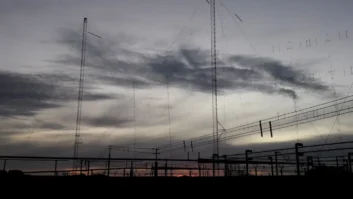New interest in profanity delays, loggers is credited to indecency debate
Janet Jackson’s breast and Clear Channel’s fines have pushed awareness of indecency issues to new levels. In the weeks after the Super Bowl incident and a separate record fine by the FCC against Clear Channel, Bubba the Love Sponge lost his job, industry superstar Howard Stern saw his affiliate list shrink and industry executives were grilled on Capitol Hill.
But one group, at least, might not be blamed for having fond feelings for Jackson or the FCC.
Suppliers and manufacturers of audio delay systems are reporting an increase in sales that they attribute to the collective rush to prevent super-sized obscenity fines in the radio industry.
Tom Roalkvam, sales manager for BSW, said his office noticed a surge in interest almost immediately.
“We noticed right away a big change. We’re hearing from people constantly looking for them, and they’re in real short supply right now.”
Roalkvam said that within a week after the Jackson stunt, “We were getting a lot of calls. The timing is such that I don’t see many other events that it could have been.”
Indecent savings
Jim Hauptstueck, resale products manager for Harris Corp., said his company saw the need for more delay devices and rushed to put together a better deal by ordering in quantity from its suppliers. Calling it “indecent savings,” Hauptstueck said Harris was “trying to combine to create purchasing power not just for a single group but for multiple groups, to give them a better deal based strictly on purchasing power.”
The early weeks following the Super Bowl, Hauptstueck said, saw a buying frenzy, creating a supply problem for stations and groups seeking delay systems.
“About 50 or 60 units in existence all went in one day,” he said. “Now it’s a matter of people stacked up looking to get units.”
Hauptstueck said he was in touch with manufacturers “almost on a daily basis,” to try to keep the supply of delay systems high enough.
Demand is high as managers and groups hurry to ensure that they don’t face possible FCC fines brought on by obscene content.
A recent crackdown on such broadcasts resulted in the largest fine ever proposed for indecency, $755,000 against Clear Channel Communications for sexually explicit segments broadcast during the Bubba the Love Sponge show during morning drive several years ago.
Following in the wake of the FCC’s actions in the Super Bowl and Bubba cases, Clear Channel and several other groups announced “zero tolerance” policies toward indecency. Releasing a “Responsible Broadcasting Initiative” in late February, the media giant pledged to ensure that material aired on its stations would conform to local standards of decency, also announcing plans for company-wide training and automatic suspensions for FCC rule violators.
Hours later, Stern’s program was dropped from six Clear Channel stations as part of the group’s zero tolerance policy. Stern is syndicated by Infinity.
“Clear Channel drew a line in the sand today with regard to protecting our listeners from indecent content, and Howard Stern’s show blew right through it,” said Clear Channel President and CEO John Hogan, referring to a show that included an interview with Paris Hilton’s ex-boyfriend and a caller who used a racial epithet on the air.
Not just a blip
So what are stations and groups rushing to buy?
“The primary pieces are Symetrix 6000 and 6100AT, and Eventides,” said Roalkvam.
Symetrix Sales Coordinator Paul Roberts said interest in delay devices spikes periodically, “whenever a jock pushes the edge in their program content” and gets caught, but this time the jump is bigger than usual.
“Every time the FCC sort of raises an eyebrow, we get a bit of a blip in sales,” Roberts said. “This is a bit more than an FCC eyebrow. We’re seeing more than a ripple, more like a small tidal wave.”
Following the Super Bowl half-time stunt, he said, orders have been flooding in to his office. “People are thanking Janet quite a bit for the increase in sales,” Roberts said.
Eventide Vice President of Sales and Marketing Ray Maxwell also reported a jump in business. Now on tits fourth generation of broadcast delay devices, Maxwell said the company “absolutely” noticed an uptick.
He said sales of its BD-500 and BD-960 delay devices had been rising prior to the recent FCC crackdown, but the combination of recent events and increased vigilance has driven sales higher in the United States.
“I think that what we’re seeing in the U.S. is an increased vigilance on the part of the FCC to uphold local standards of decency,” Maxwell said. “We offer a product that gives you a delay buffer that lives at the end of the chain and allows someone in the control room, when obscenities are uttered, to delete that obscenity before it airs.”
MDOUK offers a software-based delay for Windows called “Arse!” that has up to 30 seconds of delay. It costs approximately $970 based on current exchange rates.
Head of Sales Mo Dutta said the market for delays varies significantly depending on the country.
“In Western Europe, the use of delay systems has fallen quite significantly, maybe over a period of 5 to 10 years; there seems to have been a philosophical shift over that time,” he said.
“Broadcast management expect their production and on-air staff to use more active techniques to stem the problems of obscenity or the broadcast of libelous content before they occur, such as better call screening, databasing of regular callers to talk shows using caller-ID aware systems, pre-studio briefings to celebrity guests who have the potential to cause a problem, training of on-air staff – basically just making better editorial choices in the first place.”
However, he said dealers in Eastern European countries, particularly the new wave about to join the European Union, report that “the idea of using some kind of electronic prophylactic to guard against on-air accidents is pretty much as popular as it is in the U.S. … Perhaps this again just reflects a greater degree of conservatism within their societies.”
Dutta said his product offers a configurable “Wipe” feature that gives the operator “an added degree of confidence with something that came as close to being able to ‘edit’ a live radio show as is possible” – what Dutta called the “unachievable Holy Grail” for a profanity delay.
While sales of delay devices are up, will they continue to rise? Roberts said Symetrix sales volume has been “quite large, probably like four or five months worth of orders in the last month alone.” He said the word from product representatives is that more sales are on the way.
“Dealers are saying a lot more sales are coming in now that station managers are scrambling to get delays in their stations.”
Eventide also makes logging systems; at the upcoming NAB convention, it will debut the first Linux-based broadcast logger device, the VR-1615B.
“I think many broadcasters are (buying loggers) proactively rather than waiting for the FCC to require it,” said Maxwell. “I predict we’ll see more broadcasters doing that in the coming months.”
Contractual changes
An increase in use of delay devices is not the only change coming to the radio industry. As part of its Responsible Broadcasting Initiative, Clear Channel jocks will share part of the responsibility for any obscene content that makes it on the air. Contract policies are being modified so that jocks share financial responsibility for fines incurred due to obscenities sneaking through on their watch.
“From now on, every contract that Clear Channel enters into with on-air talent will include this provision,” Hogan said. “While that won’t relieve Clear Channel from our responsibility as a broadcast licensee, we believe it will have a significant deterrent effect on indecent content.”
AFTRA, the union of radio and television artists, reacted immediately with criticism to that initiative, saying broadcast owners should not blame jocks for failures of program policy.
ContentCheck Grows Out of Clear Channel Project
Here’s another approach to a program delay, as pointed out by Jeff Littlejohn, senior vice president of engineering for Clear Channel Radio.
“Delays are great, but for the most part you have to be pretty quick on the trigger to make them work,” he said. “And if a bit takes 2 or 3 minutes to develop, you really don’t want to just cut out the punch line. You’d rather erase the entire segment.
“Prior to parting ways with Bubba, we had Prophet Systems develop a delay to deal with our concerns … it worked so well that Kevin Lockhart decided to market it as a retail product.” Supplier Prophet also is owned by Clear Channel; Lockhart is president.
The product is called ContentCheck; it works as a standalone system or with Prophet’s NexGen or other automation systems.
“This delay isn’t for everyone,” Littlejohn said, “but if someone has a really ‘on-the-edge’ morning team, I think it’s a perfect fit. While it will allow up to a one-hour delay, I think most people would use it as a 5-10 minute delay … which allows plenty of time to edit, but also keeps it timely.”
For information, visit www.prophetsys.com/lines/Broadcast/contentcheck.asp








